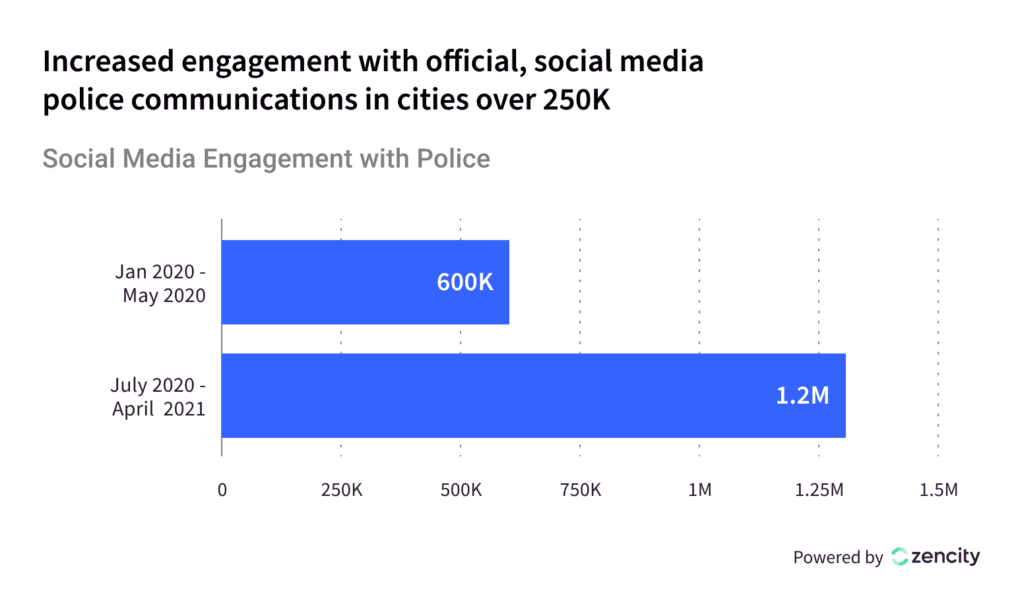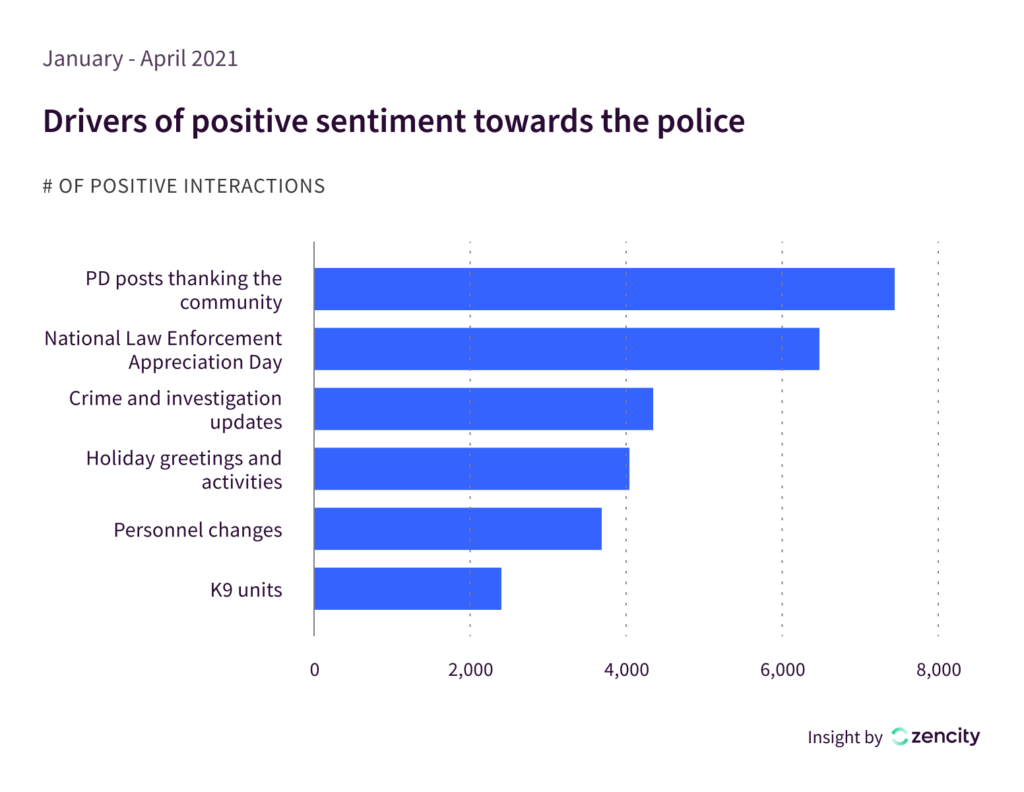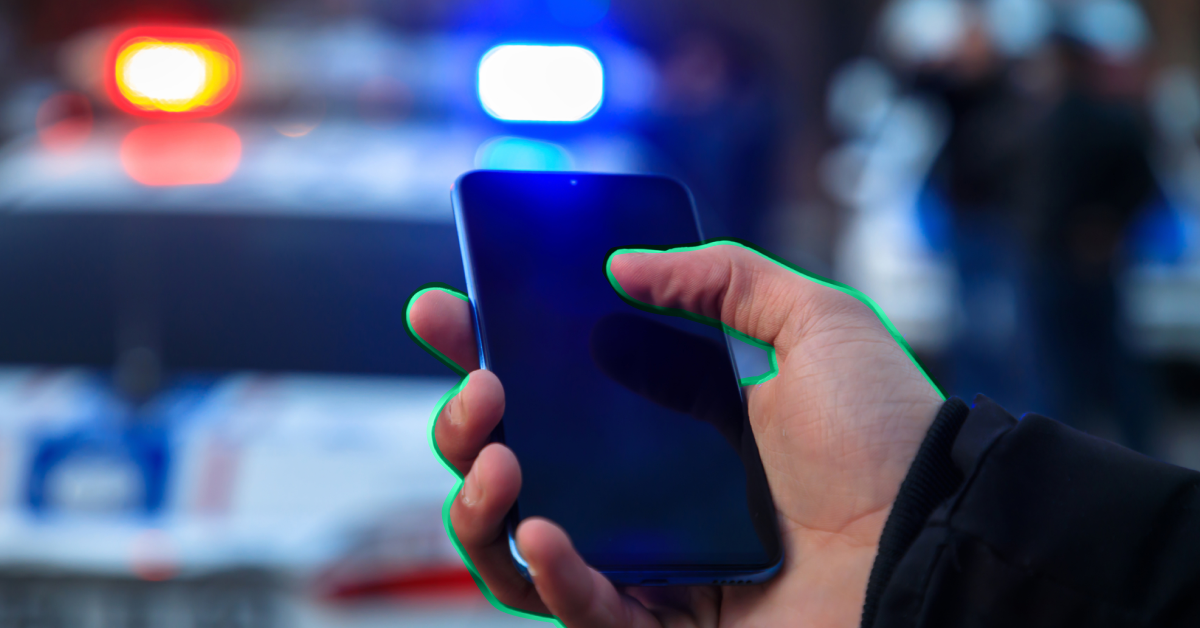Can social media help law enforcement increase trust? 3 trends say yes

Maurice Classen
Chief Operating Officer
As law enforcement agencies work to bridge a growing trust gap with community members, police departments have identified the importance of transparent, two-way communication and are increasingly turning to social media as a way to hear from residents. At Zencity, we’ve been measuring trends in citizen engagement with law enforcement, as well as attitudes towards policing across the country, in order to help law enforcement agencies improve community relationships. Below are some of the key trends we’ve identified, along with ideas for how law enforcement agencies can utilize social media to build trust.
Trend #1: Social media is increasing direct dialogue with law enforcement
Through data analysis we ran earlier this year, we found that in big cities where police communications are often more robust, monthly engagement with police departments on social media has more than doubled since last summer. Not surprisingly, this comes with a 101% increase in proactive police communications – meaning police are also amping up their social media game.
This shows that when law enforcement agencies use their social media channels to engage, residents are ready to engage back, demonstrating the potential role open channels like social media platforms can play in helping to bridge the public trust gap between law enforcement agencies and their communities.

Trend #2: Most law enforcement agencies are using social media
Many (and in fact the majority) of law enforcement agencies in the United States have a social media presence. Social media can be a useful tool in helping to advance the benefits of community policing by humanizing law enforcement officers, disseminating timely information, and directly engaging with citizens. The most popular social platform, being used by 94% of law enforcement agencies, is Facebook, followed by Twitter at 71%, and YouTube at 40%.
Trend #3: Using official law enforcement social media accounts to drive positive sentiment
How can social media be used to improve relations between police departments and the community? One major California Police Department has the answer. After reevaluating their communications strategy and online presence, the police department of one major California city went from generating 16% negative sentiment from online discourse, to 22% positive sentiment.

An analysis of the leading drivers of positive sentiment towards the department showed that they included:
- Official PD posts thanking the community for their cooperation and assistance in locating missing persons
- The National Law Enforcement Appreciation Day in January, which generated a significant amount of positive buzz in just one day
- Updates about crimes and investigations, which included many grateful comments by residents responding to the Department’s Human Trafficking Unit interview room held at the beginning of March
- The Department’s holiday greetings and related activities
- Departmental announcements about personnel changes, including congratulating new Forensic Investigators, Community Service Officers, and Sergeants
- Updates and pictures of the department’s K9 units
So what did this California city’s police department do right to drive positive sentiment?
Social Media as a Civic Engagement Tool (and more!) for Law Enforcement
Social media is a form of ‘owned’ media, meaning it allows users to ‘own’ their narrative, which is exactly what the California city above did. By including updates about their department’s K9 units, holiday activities, and departmental changes, as well as by thanking the community for their participation in community events, they managed to humanize the department, include the community, and encourage conversation—which is the key to good social media use by law enforcement. Perhaps most importantly, the ability to put a face to officers of a department reminds community members that officers are residents too, working to serve and protect their community.
In addition to humanizing the department, the use of social media by law enforcement agencies enables them to shape emerging narratives and communicate directly with the public, rather than rely on external outlets to cover events, which could potentially have disastrous consequences. As with the California city in question, updates about crimes and investigations or calls for assistance with missing persons can show the public a commitment to serving them, to considering them as partners in the community, and to keeping their best interests at heart.
But law enforcement social media isn’t just about the narrative: agencies can target their communications and broaden their outreach through social media, connecting with citizens, spreading knowledge quickly and with minimal effort, and working together with their community.
We’ve seen time and time again in the Zencity data, the positive impact social media can have on the relationship between law enforcement agencies and their communities. While police have increasingly been reaching out via social media, accordingly, residents have been responsive to these communications. Americans have begun using police social media channels as a platform to voice their criticism, support, and demand for policy changes, and a major shift has taken place – where conversation is no longer just about police, but also occurring with police.
Law enforcement agencies across the US are working hard to rebuild trust among their community members. By leveraging channels residents already trust for open communication—like social media—law enforcement officials can improve transparency and inclusivity, gauge public perception in real-time, and understand discourse around the topics and events that matter most to residents.
%20copy-1.png?width=544&height=120&name=Logo_black%20(1)%20copy-1.png)



